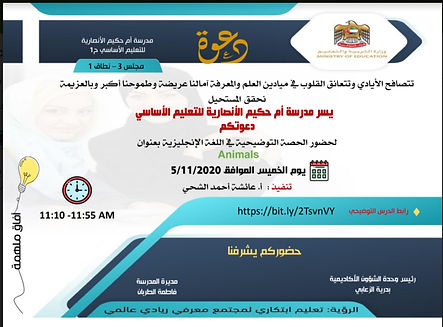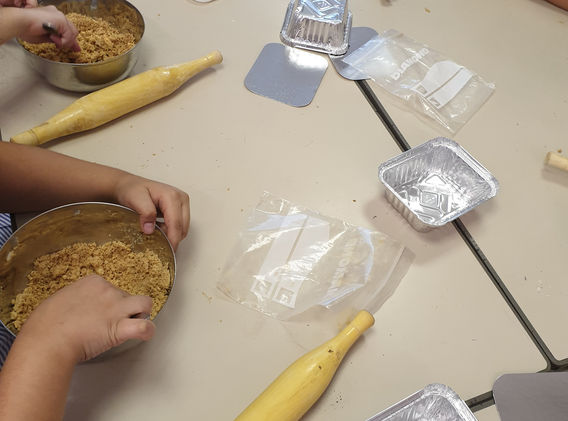Commitment to Profession
Page overview:
This page includes content that shows how I was committed to the profession of teaching, and the ways I was professional throughout my teaching practices.
Definition
An effective educator constantly searches for new ways to enhance the quality of education they provide. Some qualities that highlight a teacher's commitment to the teaching profession include communication with other stakeholders, maintaining a professional appearance, and being punctual (Zeiger, 2018).
Punctuality
Rationale
Evidence of effective teaching is apparent when time is used wisely. In an article titled "Teacher's Effectiveness and its influence on students' learning", it is stated that a teacher who comes late to class does not maximize instructional time (Aina, Olanipekun, and Garuba, 2015). After teaching consecutive lessons to students, it became clearer how valuable each second of a period is, and how important it is to use each minute sensibly.
I attended all days, and all classes on time. At the end of the day, I would sometimes stay a while longer and discuss some things with my MST. For example, we talked about students' behavior, appropriate intervention strategies and topics that will be covered.
Trainee Teaching Time

Description
According to Aglazor (2017), the purpose of teaching practice is "To provide student-teachers with an opportunity for further acquisition of professional skills, competencies, personal characteristics and experience for full-time teaching after graduation" (p.102). As a novice teacher, when I commit myself to full-time planning and teaching, I gain new skills and learn more about my planning abilities and how to better plan lesson. I believe that planning for learning is highly crucial and I view it as an integral part of learning, as stated in my teaching philosophy.
As trainees in our last semester, it is required for us to take full-time responsibility of our mentor's time for 60% of her teaching time. I was able to plan and teach full lessons in place of my MST. I believe this helped me become more confident and comfortable teaching.
Rationale
Extra Activities
As a teacher, it is important to stay by students' side, and attend important events and activities with them. Some examples as seen in the images above include being present during special celebrations like the UAE flag day during distance learning, attending a smart learning session, cookery club, music club, and a sports day event.
A constructivist approach to the student-teaching context would be to involve student-teachers in situations that allow them to confront real-life situations such as that exhibited in co-curricular activities. It also enhances group work abilities, which are important for teachers when working with other faculty members at the school (Marais, 2011). As I engaged with these events, I conversed with different teachers and learned about their experiences which contributed to my learning.
Rationale
Observing Other Teachers
_POr.jpg)
_Eportfolio_edited_j.jpg)
English Lesson - Grade 4
English Lesson - Grade 3
Description
Description
Description
During my online teaching practice, I was invited to attend several lessons taught by teachers from different schools, teaching different subjects to various grade levels. I happily accepted all invitations and was able to learn a lot from these teachers.
Science Lesson - Grade 8: Use of KWL Assessment strategy

My Implementation of the KWL Strategy



Description
After attending a Science lesson with 8th graders, I observed the teacher use a KWL (What I Know, What I Want to Know, What I Learned) assessment technique, in which students share their knowledge about what they know about a topic. It is a great assessment strategy, and so I decided to implement it in my own lesson.
Rationale
When we observe other teachers, we can look at teaching in a whole new light. We pick up strategies and reflect on our own approaches (Buckner, Chedda and Kindreich, 2016). After observing various teachers throughout my teaching placements, I have become more able to hone my own teaching skills and implement those I have observed from others.
References
Aglazor, G. (2017). The role of teaching practice in teacher education
programmes: Designing framework for best practice. Global Journal of
Educational Research, 16. https://doi.org/10.4314/gjedr.v16i2.4
Aina, J. K., Olanipekun, S. S., & Garuba, I. A. (2015). Teacher's effectiveness
and its influence on students' learning. Advances in Social Sciences
Research Journal, 2(4), 88-95. https://doi.org/10.14738/assrj.24.1082.
Buckner, E., Chedda, S., & Kindreich, J. (2016, June). Teacher professional
development in the UAE: What do teachers actually want? Sheikh Saud bin
Saqr Al Qasimi Foundation for Policy Research. https://www.academia.edu/
25943209/
Teacher_Professional_Development_in_the_UAE_What_Do_Teachers_Actually_Want
Marais, P. (2011). The significance of student teachers' involvement in
co-curricular activities. International Journal for E-Learning Security
(IJeLS), 1(2). https://infonomics-society.org/wp-content/uploads/ijels/
published-papers/volume-1-2011/
The-Significance-of-Student-Teachers-Involvement-in-Co-Curricular-Activities.pdf
Ward, J. R., & McCotter, S. S. (2004). Reflection as a visible outcome for
preservice teachers. Teaching and Teacher Education, 20(3), 243-257.
https://doi.org/10.1016/j.tate.2004.02.004
Zeiger, S. (2018, June 28). List of core competencies for educators. Retrieved
April 23, 2020, from https://work.chron.com/
list-core-competencies-educators-8916.html




